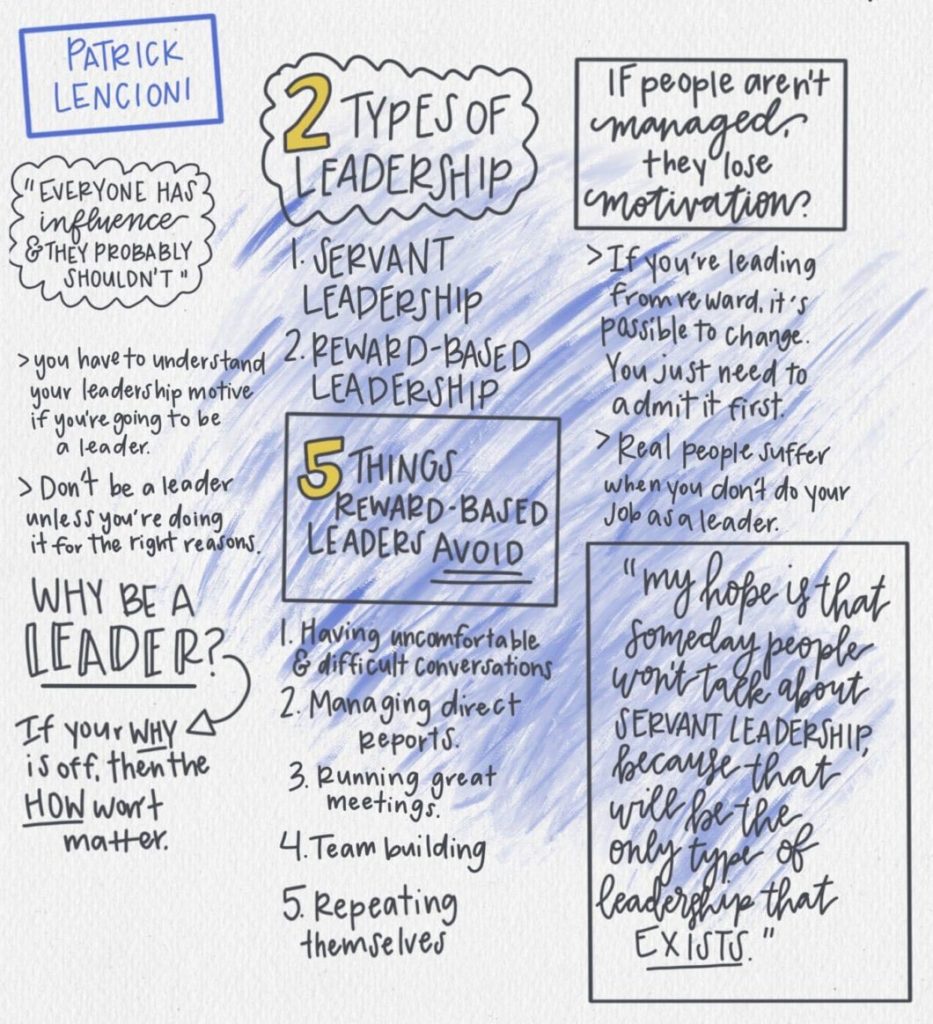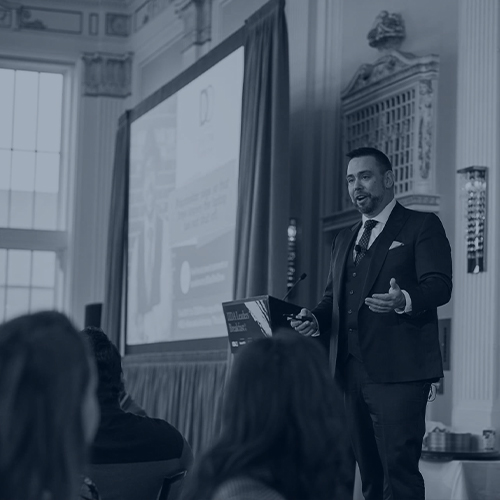Day One Reads – The Motive
“Whenever I hear a graduation speaker exhort a group of students to ‘go out into the world and be a leader’ I want to stand up and shout: ‘No! Please don’t be a leader unless you’re doing it for the right reasons.’” (Very first line of “The Motive”)
My list of leadership “must reads” is peppered with Patrick Lencioni’s work. The Five Dysfunctions of a Team was transformative for me and I’ve gobbled up everything else he’s ever put out. Lencioni calls this “his simplest and shortest book, but perhaps my most important.” I agree, and I recommend anyone looking to start exploring Lencioni’s work begin with The Motive before diving into the rest of his catalogue.

The Motive: Why So Many Leaders Abdicate Their Most Important Responsibilities
Title: The Motive: Why So Many Leaders Abdicate Their Most Important Responsibilities
Category*: Reflective
Author: Patrick Lencioni
About the author:
Patrick Lencioni is founder and president of The Table Group, a firm dedicated to helping leaders improve their organizations’ health since 1997. His principles have been embraced by leaders around the world and adopted by organizations of virtually every kind including multinational corporations, entrepreneurial ventures, professional sports teams, the military, nonprofits, schools, and churches.
Lencioni is the author of ten business books with over three million copies sold worldwide. His work has appeared in the Wall Street Journal, Harvard Business Review, Fortune, Bloomberg Businessweek, and USA Today.
Prior to founding The Table Group, Lencioni served on the executive team at Sybase, Inc. He started his career at Bain & Company and later worked at Oracle Corporation.
How I found it: I busted my ass to get three books completed and reviewed in advance for Day One Reads last month because I had an epic 19 hour audiobook I wanted to cover and knew it might take me more than a week. Unfortunately, I found myself ill for an extended period and ended up falling behind. As such, I was on the lookout for something short but substantive for this week, and when I spotted a Lencioni book I hadn’t yet read, I knew the universe was on my side.

“Don’t be a leader unless you’re doing it for the right reasons.”
The following are notes from Patrick Lencioni’s talk at #GLS19.
Book Jacket description: Shay was still angry but shrugged nonchalantly as if to say, it’s not that big of a deal. “So, what am I wrong about?”
“You’re not going to want to hear this, but I have to tell you anyway.” Liam paused before finishing. “You might be working hard, but you’re not doing it for the company.”
“What the hell does that mean?” Shay wanted to know.
Knowing that his adversary might punch him for what he was about to say, Liam responded. “You’re doing it for yourself.”
New York Times best-selling author Patrick Lencioni has written a dozen books that focus on how leaders can build teams and lead organizations. In The Motive, he shifts his attention toward helping them understand the importance of why they’re leading in the first place.
In what may be his edgiest page-turner to date, Lencioni thrusts his readers into a day-long conversation between rival CEOs. Shay Davis is the CEO of Golden Gate Alarm, who, after just a year in his role, is beginning to worry about his job and is desperate to figure out how to turn things around. With nowhere else to turn, Shay receives some hard-to-swallow advice from the most unlikely and unwanted source―Liam Alcott, CEO of a more successful security company and his most hated opponent.
Lencioni uses unexpected plot twists and crisp dialogue to take us on a journey that culminates in a resolution that is as unexpected as it is enlightening. As he does in his other books, he then provides a straightforward summary of the lessons from the fable, combining a clear explanation of his theory with practical advice to help executives examine their true motivation for leading. In addition to provoking readers to honestly assess themselves, Lencioni presents action steps for changing their approach in five key areas. In doing so, he helps leaders avoid the pitfalls that stifle their organizations and even hurt the people they are meant to serve.
Amazon Rating: 4.7 (69 ratings – Canada)/4.7 (87 ratings – US)
Goodreads Rating: 4.44 (347 Ratings)
Anything someone might quibble with: The only thing I can think of is that the book left me thinking that there was room to expand on some of the ideas and strategies. However, leaving us wanting more is different than not giving us enough, and it’s possible that feeling comes from comparing it to his other books rather than assessing it as a standalone.

Management is the act of aligning people’s actions, behaviours and attitudes with the needs of the organization and making sure that little problems don’t become big ones. Avoiding this is nothing but negligence.

“Velcro quotes” (ideas that are going to stick with me moving forward):
- “There are only two motives that drive people to become a leader: first, they want to serve others; to do whatever is necessary to bring about something good for the people they lead. They understand that sacrifice and suffering are inevitable in this pursuit, and that serving others is the only valid motivation for leadership. This is why it annoys me when people praise someone for being a servant leader, as though there is any other valid option. The second basic reason why people choose to be a leader-the all too common but invalid one-is that they want to be rewarded. They see leadership as the prize for years of hard work and are drawn by its trappings: attention, status, power, money.”
- “Reward-centred leadership: the belief that being a leader is the reward for hard work, therefore the experience of being a leader should be pleasant and enjoyable. Free to choose what they work on and avoid anything mundane, unpleasant, or uncomfortable. Responsibility-centred leadership: the belief that being a leader is a responsibility, therefore the experience of leading should be difficult and challenging, though certainly not without elements of personal gratification. No leader is purely reward-centred or responsibility-centred. We all struggle at times and we all rise up to do the right thing at times. But one of these two motives for leadership will be predominant, and that motive will have a profound impact on the success of the leader and the organization he or she serves.”
- “Trusting someone is not an excuse for not managing them…managing someone is not a punitive activity, not a sign of distrust. And it doesn’t change based on a person’s seniority or tenure. Management is the act of aligning people’s actions, behaviours and attitudes with the needs of the organization and making sure that little problems don’t become big ones. Avoiding this is nothing but negligence.”
- “What is tolerated at the top of an organization is often the ceiling of what can be expected within it.”
- “If reward-centred, self-centred leadership becomes the norm young people will grow up believing that this is what it means to be a leader. The wrong people will aspire to be managers, CEOs and civic leaders, condemning society to more of the same for generations to come. This can’t be allowed to happen. I believe it’s long past time that we as individuals, and as a society, re-establish the standard that leadership can never be about the leader more than the led…if we can restore the collective attitude that leadership is meant to be a joyfully difficult and selfless responsibility I am convinced that we will see companies become more successful, employees more engaged and fulfilled, and society more optimistic and hopeful. Perhaps people will stop using the term ‘servant leadership’ altogether, because everyone will understand that it is the ONLY valid kind.”
Total Pages: 192
Total “pulled passages”: 39
Page to Pulled Passage Ratio**: 4.9:1
P2P Ranking within category for 2020: #1 of 5
Overall P2P Ranking for 2020: #6 of 13.
*I break books into one of three categories in order to better compare apples-to-apples.
- Reflective: Relies on first-person stories or insights
- Biographical: Tells the story of an individual or organization from a third-person perspective
- Research-based: The author(s) collect third-party research to support their discussion of a particular topic.
**As I read, I highlight certain passages/insights that really connect with me. Things that make me think “buying this book was worth it for ideas/information like that.” At the end of the book, I go back and “pull” them from the book and copy them all into a single document. P2P Ratio indicates how many pages on average tend to go by between these particularly powerful insights. This book’s 4.9:1 ratio means I felt there was a passage worth pulling out and writing down every 4.9 pages.







